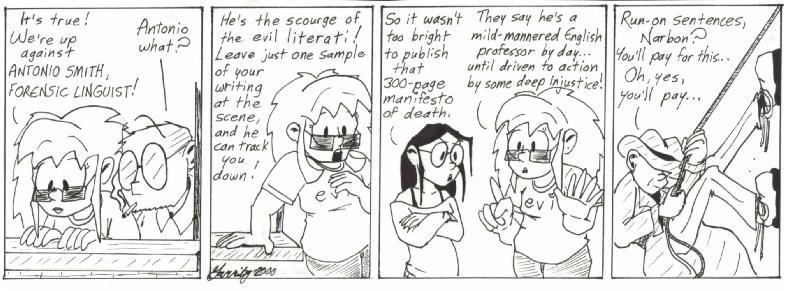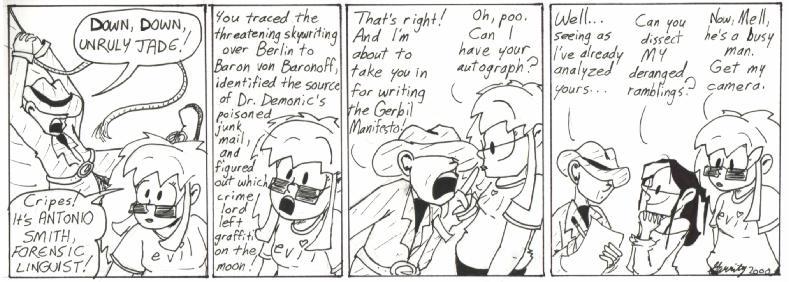Dueling linguists
« previous post | next post »
According to Ian Sherr, "Apple, Microsoft Hire Linguists to Duel Over App Store Name", WSJ 3/30/2011:
Microsoft Corp. (MSFT) and Apple Inc. (AAPL) have both hired linguists to serve as experts in the tech titan's ongoing battle over whether or not the government can grant a trademark for the term "app store."
Microsoft's expert is Ron Butters, who is quoted as writing that "The compound noun app store means simply 'store at which apps are offered for sale,' which is merely a definition of the thing itself — a generic characterization".
Apple's linguist is Robert Leonard, who "who asserted that the electronics giant's 'App Store' was a proper noun and deserved to be trademarked, even though the words are generic when separated".
There's some useful (though partisan) discussion of the history here, and the filings in the case appear to be indexed here, where you can find Robert Leonard's declaration and Ron Butters' rebuttal. In addition, Microsoft has filed a sort of post-mortem of "app store" hits in Lexis/Nexis, by Nathaniel Durrance, here.
Curiously, Profs. Butters and Leonard are also engaged on opposite sides of a current criminal case. According to Beth Hundsdorfer, "Expert ties threats, graffiti to Coleman", St. Louis News-Democrat, 3/19/2011:
A forensic linguist testified Friday that emailed threats, threatening letters and spray-painted graffiti at the murder scene were "consistent" with documents written by murder suspect Christopher Coleman.
Circuit Judge Milton Wharton will decide whether Robert Leonard, a forensic linguist at Hofstra University in New York, will testify at Coleman's upcoming murder trial.
Leonard testified that people have certain patterns in their written words that allow a forensic linguist to determine whether documents may have the same author. […]
The defense announced their intention to call an opposing expert Ron Butters, a former professor at Duke University and forensic linguist, but O'Gara stated he was not available to testify at Friday's hearing.
Wharton reserved ruling on whether the forensic linguists' testimony will be heard at trial, but scheduled the final pre-trial hearing in the case for April 4.
I believe that it's time for Shaenon K. Garrity to resume her Narbonic strip, which went into hiatus at the end of 2006. Or perhaps she could give Antonio Smith, Forensic Linguist, his own spin-off series. Though this time, perhaps, a little less emphasis on correcting real or imagined usage errors, and a bit more on (say) defeating legions of Zombie Rules.


Henning Makholm said,
March 30, 2011 @ 9:52 am
Narbonic did not go into hiatus. It ended fair and square, tying up its plot arcs nicely as it went.
[(myl) But Sherlock Holmes came back, even after Conan Doyle killed him off at the Reichenbach Falls. The period of his absence is known to Holmesians as "the Great Hiatus". Surely we can hope for something similar to happen with Helen Narbon, or at least with Antonio Smith.]
John Baker said,
March 30, 2011 @ 9:58 am
Narbonic didn't go into hiatus; it completed its telling of an integrated multiyear story. So I don't think it's coming back. Its creator, Shaenon Garrity, is currently drawing a webcomic called Skin Horse, http://www.webcomicsnation.com/shaenongarrity/skinhorse/series.php. Skin Horse is a fine webcomic, but it's shockingly short on forensic linguists.
ANTONIO SMITH, FORENSIC LINGUIST, was based on real life forensic linguist Donald Wayne Foster, http://en.wikipedia.org/wiki/Donald_Wayne_Foster, although I suspect that the resemblance is not close. Garrity studied under Foster in college.
[(myl) Yes, Shaenon Garrity's commentary on the second of the strips above is relevant:
]
Leonardo Herrera said,
March 30, 2011 @ 10:36 am
What about 'book store'?
ohwilleke said,
March 30, 2011 @ 11:53 am
Butters for Microsoft has the better case on the merits IMHO. It is not enough to show that the words combined are a proper noun. All names assigned to specific individual enterprises are proper nouns. Leonard's conclusion for Apple is a "so what?" conclusion, as it has to show that the combined words have an idiomatic meaning that is both different from the individual descriptive words and that the idiomatic mean is particular to their enterprise rather than being merely descriptive.
John Cowan said,
March 30, 2011 @ 1:33 pm
Leonardo Herrera: It doesn't matter. "Sports Store" is not a U.S. trademark, but "My Sports Store™" is.
Q. Pheevr said,
March 30, 2011 @ 1:42 pm
Although Narbonic has finished, Garrity does undertake commissions from time to time. Maybe we could start a pool to hire her to draw an ANTONIO SMITH vs. the Zombie Rules mini-comic, if that wouldn't be too far out of character.
Chandra said,
March 30, 2011 @ 1:55 pm
There has got to be a pen-mightier-than-the-sword joke somewhere in here.
Nathan Myers said,
March 30, 2011 @ 3:18 pm
Anything that increases employment of linguists must be good, right?
Urso said,
March 30, 2011 @ 5:03 pm
"It doesn't matter. "Sports Store" is not a U.S. trademark, but "My Sports Store™" is."
I don't doubt that. But the USPTO is known to act as little more than a rubber stamp — their job is just to make sure you're not duplicating someone else's registered mark. They don't worry so much about whether it's generic. Long story short, just because the USPTO registers a trademark doesn't mean the courts will actually enforce it.
My initial reaction is that App Store is generic; indeed, that it's *obviously* generic. But then I'm not a linguist.
ohwilleke said,
March 30, 2011 @ 5:08 pm
"But the USPTO is known to act as little more than a rubber stamp — their job is just to make sure you're not duplicating someone else's registered mark."
USPTO absolute enforces other requirements like the generic one, but given the flow of marks, some get through, like "Palisade Red" for red wine made in Palisade, Colorado. When I see those exceptions I always ask myself who the lucky sods who manage to get stuff like that though are when the USPTO always prevents my clients from having similar successes and also loses the materials that you send them one time in three.
J. W. Brewer said,
March 30, 2011 @ 5:51 pm
Wait a minute. Donald Wayne Foster investigates murders but has not been charged with committing any? That makes him a counterexample to one of the most-studied linguistic patterns in modern American criminology: http://www.newsoftheweird.com/wayne.html.